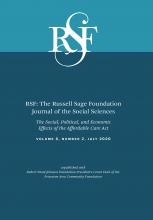Research Article
Open Access
The Affordable Care Act and Polarization in the United States
Julianna Pacheco, Jake Haselswerdt, Jamila Michener
RSF: The Russell Sage Foundation Journal of the Social Sciences July 2020, 6 (2) 114-130; DOI: https://doi.org/10.7758/RSF.2020.6.2.05
Julianna Pacheco
aAssociate professor of political science at the University of Iowa
Jake Haselswerdt
bAssistant professor of public policy and administration at the University of Missouri
Jamila Michener
cAssistant professor in the Department of Government at Cornell University

REFERENCES
- ↵
- Arellano, Manuel
- ↵
- ↵
- Bartels, Larry M
- ↵
- Bolsen, Toby,
- James N. Druckman, and
- Fay Lomax Cook
- ↵
- ↵
- ↵
- Caughey, Devin,
- James Dunham, and
- Christopher Warshaw
- ↵
- Caughey, Devin, and
- Christopher Warshaw
- ↵
- Clinton, Joshua D., and
- Michael W. Sances
- ↵
- ↵
- ↵
- Gelman, Andrew, and
- Thomas C. Little
- ↵
- Grogan, Colleen M., and
- Sunggeun Ethan Park
- ↵
- Grogan, Colleen M.,
- Phillip M. Singer, and
- David K. Jones
- ↵
- Jacobs, Lawrence R., and
- Timothy Callaghan
- ↵
- Jacobs, Lawrence R., and
- Suzanne Mettler
- ↵
- Jacobs, Lawrence R
- ↵
- Jacobs, Lawrence R
- ↵
- Jacobs, Lawrence R., and
- Robert Y. Shapiro
- ↵
- ↵
- Kastellec, Jonathan,
- Jeffrey Lax,
- Michael Malecki, and
- Justin H. Philips
- ↵
- ↵
- Lax, Jeffrey R., and
- Justin H. Phillips
- ↵
- Leeper, Thomas J., and
- Rune Slothuus
- ↵
- Lerman, Amy E., and
- Katherine T. McCabe
- ↵
- Michener, Jamila
- ↵
- Morgan, Stephen L., and
- Minhyoung Kang
- ↵
- Nicholson-Crotty, Sean
- ↵
- Pacheco, Julianna
- ↵
- Pacheco, Julianna, and
- Elizabeth Maltby
- ↵
- Pacheco, Julianna
- ↵
- Park, D. K.,
- Andrew Gelman, and
- Joseph Bafumi
- ↵
- Park, D. K.,
- Andrew Gelman
- ↵
- Redlawsk, David P
- ↵
- Richardson, Lilliard, and
- David M. Konisky
- ↵
- Rigby, Elizabeth, and
- Jake Haselswerdt
- ↵
- ↵
- Rose, Shana
- ↵
- Scott, Dylan
- ↵
- Taber, Charles S., and
- Milton Lodge
- ↵
- Warshaw, Christopher, and
- Jonathan Rodden
- ↵
- Zaller, John
In this issue
The Affordable Care Act and Polarization in the United States
Julianna Pacheco, Jake Haselswerdt, Jamila Michener
RSF: The Russell Sage Foundation Journal of the Social Sciences Jul 2020, 6 (2) 114-130; DOI: 10.7758/RSF.2020.6.2.05
Jump to section
Related Articles
- No related articles found.
Cited By...
- No citing articles found.





